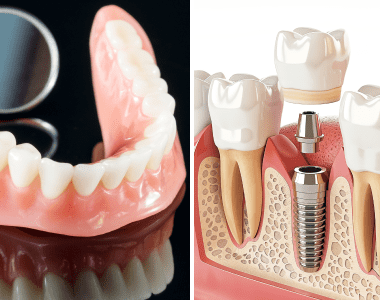
Types of Braces: Which One is Right for You?
Braces are popular orthodontic treatments that effectively correct various dental issues like crooked teeth, overcrowding, and bite problems. However, with the multitude of brace options available, selecting the right one can be challenging. In this blog post, we will discuss different types of braces and assist you in choosing the most suitable option for your specific needs.
- Traditional Metal Braces:
Traditional metal braces are the most common type of braces. They are made of metal brackets and wires and are bonded to the front of your teeth. They are effective in treating complex dental issues and are suitable for patients of all ages. However, they are noticeable and can cause discomfort and difficulty while eating.
- Ceramic Braces:
Ceramic braces are similar to traditional metal braces, but the brackets are made of clear or tooth-colored materials, making them less noticeable. They are an excellent option for patients who want to avoid the look of traditional metal braces. However, they can be more expensive than traditional metal braces and may require more maintenance.
- Lingual Braces:
Lingual braces are similar to traditional metal braces, but the brackets and wires are placed on the back of your teeth, making them invisible from the front. They are an excellent option for patients who want to avoid the look of traditional metal braces but still need extensive treatment. However, they can be more difficult to clean and adjust and may cause more discomfort than traditional metal braces.
- Clear Aligners:
Clear aligners, such as Invisalign, are a popular alternative to traditional braces. They are custom-made, clear plastic trays that fit over your teeth and gradually move them into the desired position. are virtually invisible and can be removed while eating, brushing, and flossing. However, they may not be as effective as traditional braces for complex dental issues and may require more discipline to wear consistently.
Choosing the Right Braces:
Choosing the right type of braces depends on various factors, such as the severity of your dental issue, your age, and your budget. Here are some tips to help you choose the right braces for your needs:
- Consult with your orthodontist to determine the severity of your dental issue and discuss your treatment options.
- Consider your lifestyle and daily routine. If you play sports or a musical instrument, lingual braces or clear aligners may be a better option than traditional metal braces.
- Consider your budget. Traditional metal braces are usually the most affordable option, while clear aligners can be more expensive.
- Consider your personal preferences. If you want to avoid the look of traditional metal braces, ceramic braces or clear aligners may be a better option.
In conclusion, there are various types of braces available, including traditional metal braces, ceramic braces, lingual braces, and clear aligners. Each type has its advantages and disadvantages, and choosing the right one depends on various factors. By consulting with your orthodontist and considering your lifestyle, budget, and personal preferences

 Review Us
Review Us Review Us
Review Us 

